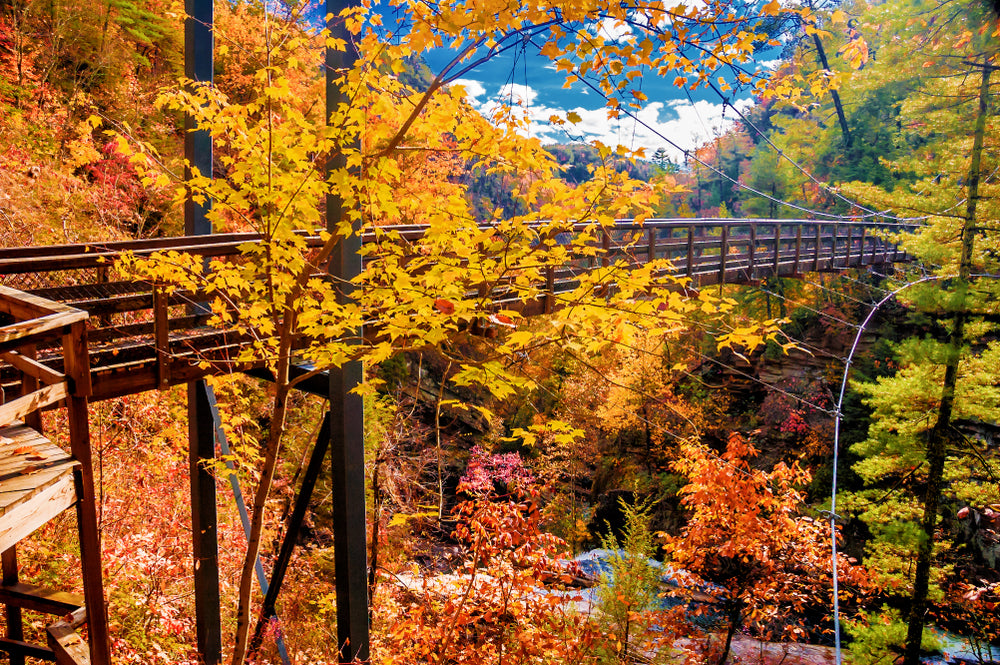Where is Tallulah Gorge State Park
Located in northern Georgia, Tallulah Gorge State Park rests in Rabun and Habersham County. The park is bounded to the north by a hydraulic dam on Tallulah River. The dam is operated by Georgia Power. Tallulah Gorge State Park surrounds the gorge that provides its name. The state park is located 99 miles or a two-hour car ride away from Atlanta. The closest city to Tallulah Gorge State Park is Tallulah Falls. Turnerville and Lakemont are also located close by.
How Large is Tallulah Gorge State Park
Tallulah Gorge State Park covers over 2,600 acres. The state park contains six waterfalls, a series of hiking trails, several gorge overlooks, a lakeside beach, and a campground. The Tallulah Gorge State Park trail system totals over 20 miles of vibrant hiking trails. Tallulah Gorge is 1,000 feet deep and was formed by the Tallulah River. The park’s lake covers over 60 acres and the park’s six waterfalls are collectively known as the Tallulah Falls. These falls cause the Tallulah River to drop over 500 feet in the course of a mile.

Tallulah Gorge State Park Weather
The weather of Tallulah Gorge US State Park varies from season to season. Summer high temperatures average 90 degrees Fahrenheit. The season’s lows average 60 degrees Fahrenheit. Winter lows in the park average 28 degrees Fahrenheit. The season’s highs average 55 degrees Fahrenheit. Tallulah Gorge State Park experiences 90 days of rain on average per rain. This rain occurs throughout the year. Snowfall in the park averages to about two inches per year. The state park frequently coordinates with the Georgia Power company to schedule water releases from the hydraulic dam. The water release schedule is available on the park’s website.
When did Tallulah Gorge Become a State Park
Tallulah Gorge became a state park in 1993. However, conversation surrounding the area’s protection and the state park’s inception began as early as 1905. Georgia’s governor, Zell Miller and Georgia Power negotiated over the park’s creation in 1993. In 1911, Helen Longstreet led an unsuccessful campaign to protect the area.

Things to do in Tallulah Gorge State Park
Tallulah Gorge State Park offers visitors various opportunities to explore the great outdoors. Our National Park Visitors Guide lists the park’s most popular adventures below:
Whitewater Rafting and Kayaking
One of the park’s most popular activities, whitewater rafting down the Tallulah River provides visitors with an exhilarating option to enjoy and take in Tallulah Gorge state park. The park’s website features a whitewater release schedule. On the dates provided, the dam on the Tallulah River will release additional water to create an impressive current. During these releases, visitors will not be permitted to hike down into the gorge. Rock climbing will also not be permitted during white water releases.
Hiking in Tallulah Gorge State Park
Tallulah Gorge State Park’s trail system contains several hiking trails that total over 20 miles in length. The park’s trails range from easy to challenging. The park’s most popular trails include backcountry access to the Appalachian Trail and several front country highlights like the Amicalola Falls and Watson Mill Bridge trail.
Mountain Biking in Tallulah Gorge State Park
Several of the park’s hiking trails are also open to mountain bikers. These trails vary in slope and terrain. Mountain bikers looking to embark down one of the park’s trails should consult the park’s website or staff about trail conditions.
Archery Range
Archers visiting Tallulah Gorge will want to bring their archery equipment along with them to the park. The park’s archery range features realistic and nonrealistic targets which archers can practice on. The state park also holds various archery events on occasion.
Rock Climbing
Tallulah Gorge State Park contains several areas optimal for rock climbing. The state park requires all climbers to obtain a permit before climbing. This permit is issued at no charge to the climber and can be obtained at the park’s visitor center. The park’s climbing routes range from beginner to advanced.
Fishing
Tallulah Gorge State Park offers anglers who visit the parks several opportunities to cast a line. The park is frequently used by fly fisherman and anglers targeting species like largemouth bass and trout. Georgia State Parks also operate a loaner tackle program. Anyone interested in fishing at Tallulah Gorge State Park who doesn't have the proper tackle can consult the park’s visitor center about the program.
Interpretive Programs
The staff at Tallulah Gorge State Park put on several interpretive programs throughout the season. These programs vary in topic, but usually cover areas such as natural history, geology, or wildlife studies. The park’s program schedule can be found on the park’s website or by visiting the park’s visitor center.
Camping in Tallulah Gorge State Park
The campsites in Tallulah Gorge State Park are split between a front country campground and several backcountry sites. The 50 front country sites contain electric and water hookups. These campsites can be used by visitors who are tent camping and by visitors driving an RV. The park’s various backcountry sites require visitors to hike in. All sites are reserved online through the state’s camping portal. Reservations for campsites in Tallulah Gorge State Park can be made up to six months in advance.
Wildlife Viewing
The wildlife in Tallulah Gorge State Park is diverse and abundant. The park contains woodland species such as deer, squirrels, turkeys, and racoons, as well as a list of avian species. Visitors looking to spot the park’s various wildlife species will want to visit the park in spring when wildlife is the most abundant.

When to Visit Tallulah Gorge State Park
List of Parks recommends the best time to visit Tallulah Gorge State Park is in the summer. During the season, the park’s hiking trails and the Tallulah River are best enjoyed. Visiting during spring and fall are also great options. In the spring, visitors can expect wildlife to be the most active. Fall is a great time for visitors looking to take in the season’s colors. The leaves in and around the park begin to change in mid-September or early October.
Must-Haves To Bring to Tallulah Gorge State Park
Any outdoor adventure requires at least a little packing and planning. This list of several essentials to bring with you to Tallulah Gorge State Park will make packing just that much easier.
Water
Water, water, and more water. Every visitor, especially those visiting during summer should bring plenty of water along with them to Tallulah Gorge State Park. Hikers and campers should bring additional water to hydrate themselves throughout their activities.
Energy-Filled Snacks
Easy, lightweight, and energy filled snacks are best for hikers and climbers. Beef jerky, protein bars, trail mix, and dried fruit are classic favorites. These snacks can provide a much needed boost at the end of a long trail or day.
Archery & Fishing Gear
To enjoy all Tallulah Gorge State Park has to offer, anglers and archers will want to bring their respective equipment along with them. The park also is enrolled in Georgia’s tackle loaner program. This program lends equipment to anglers who otherwise wouldn’t be able to fish within the state’s parks.
Camping Gear
Campers looking to utilize Tallulah Gorge State Park’s campground will want to remember to pack their tents, sleeping bags, sleeping mats, and blankets. Other items campers may want to bring include flashlights, extra batteries, camping pillows, and other equipment.
Layers of Clothing
Temperatures in Tallulah Gorge State Park can vary depending on your location and elevation. Your activity levels will also dictate your body’s temperature. It is best to wear a series of lightweight layers on your trip to Tallulah Gorge.
Park Maps
The park’s trail system includes several intersections that can confuse even the most seasoned hikers. All hikers should look to obtain and study the park’s trail map. These maps can be found at the park’s visitor center or on the park’s website.

Where to Stay in Tallulah Gorge State Park
Campers looking to stay within the Tallulah Gorge Campground or at the state park’s various backcountry sites will want to make a reservation through the park’s online portal. Reservations are required year-round for all sites. Reservations should be made several months ahead when possible. The park’s campground frequently fills during summer and during peak weekends. Visitors looking to stay at a hotel in the area will want to scout out options in Tallulah Falls, Turnerville, or Lakemont. Atlanta is also an option for visitors willing to make the hour drive.
Food Near Tallulah Gorge State Park
The closest options for visitors to obtain a hot meal or replenish supplies can be found in Tallulah Falls. Turnerville and Lakemont also provide additional options. Visitors looking for a larger culinary scene will want to visit Atlanta. The capital has an endless variety of restaurants and bars.

Airports Near Tallulah Gorge State Park
The closest airport to Tallulah Gorge State Park is located in Atlanta. The Hartsfield- Jackson International Airport is roughly 105 miles and a one hour and forty-five minute drive away.

